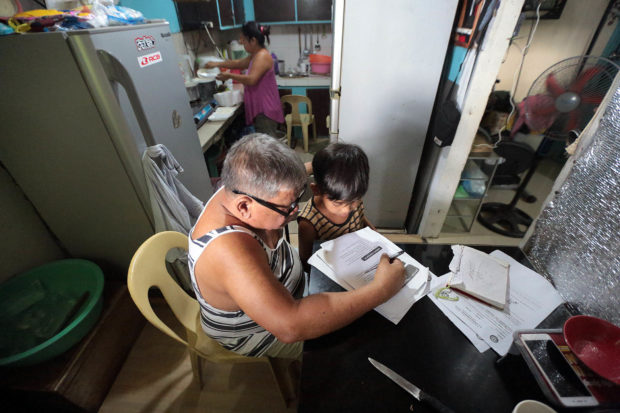
TUTORING Victor Torres of Tondo, Manila, helps his grandson, Grade 2 student John Audrey Bucog, with his online lessons. —GRIG C. MONTEGRANDE
MANILA, Philippines — Just three days after classes opened last week, Lolit Arasola heard her daughter, Ariane, a Grade 9 public school student in General Mariano Alvarez, Cavite province, weeping in the middle of the night.
“At first, she would not tell me why she was crying. But after a while, she told me that she was afraid she would not be able to finish her requirements in time for collection the next day, or that the teacher would not accept them,” Arasola told the Inquirer on Sunday.
The 59-year-old mother of five said she later learned that her daughter was expected to finish within a week three weeks’ worth of homework for her entrepreneurship class.
Ariane was among the scores of students who found themselves overwhelmed and overworked under the new way of learning due to COVID-19, with in-person classes indefinitely banned.
While her daily school schedule was from 7 a.m. to 4 p.m., classes often extended into the evening, with Ariane forced to skip meals just so she could finish her modules in time for submission the next day.
Arasola said that based on the schedule printed on Ariane’s modules, students were expected to learn and comprehend within a day lessons usually taught in school for a week.
“I told her to do only what she can and to not to be scared. If her teacher scolds her because of homework, then she should leave it to me. It pains [my husband and I] to see her like this,” said Arasola, a sari-sari store owner married to a jeepney driver.
She added that she had asked her other daughter, a Grade 12 student, to help Ariane answer the modules.
“I can clearly see that my daughter is sincere in her studies. But the requirements really are too much even for her,” Arasola said.
According to her, the class schedules and requirements could not be changed even with consultation with Ariane’s teachers, adding that any adjustments to the modules was up to the Department of Education (DepEd).
Further fueling her fears was the news about a student who committed suicide after a teacher rejected his unfinished module, as well as “pressure and difficulty” in using the learning materials.
The DepEd, however, said that according to the student’s relatives, he had been experiencing episodes of depression a month before the country was locked down due to COVID-19.
“This [was] a very sad incident and that’s the reason why we [have] psychosocial programs in place,” June Arvin Gudoy, DepEd public service affairs director, told reporters.
The DepEd said there were webinars and psychosocial interventions available on its social media pages to deal with stress among teachers, parents and students.
At a recent press conference, Ronilda Co, education director for disaster risk reduction and management services, said the DepEd was creating a referral system to “link” students and teachers to institutions that would handle mental health concerns.
She added that weekly webinars also discussed ways to ease mental and emotional stress among students when accomplishing tasks, as well as “mental prayers” that could provide a boost.
Even Education Secretary Leonor Briones herself acknowledged the problem and assured the public they were working with mental health professionals to find solutions. INQ

